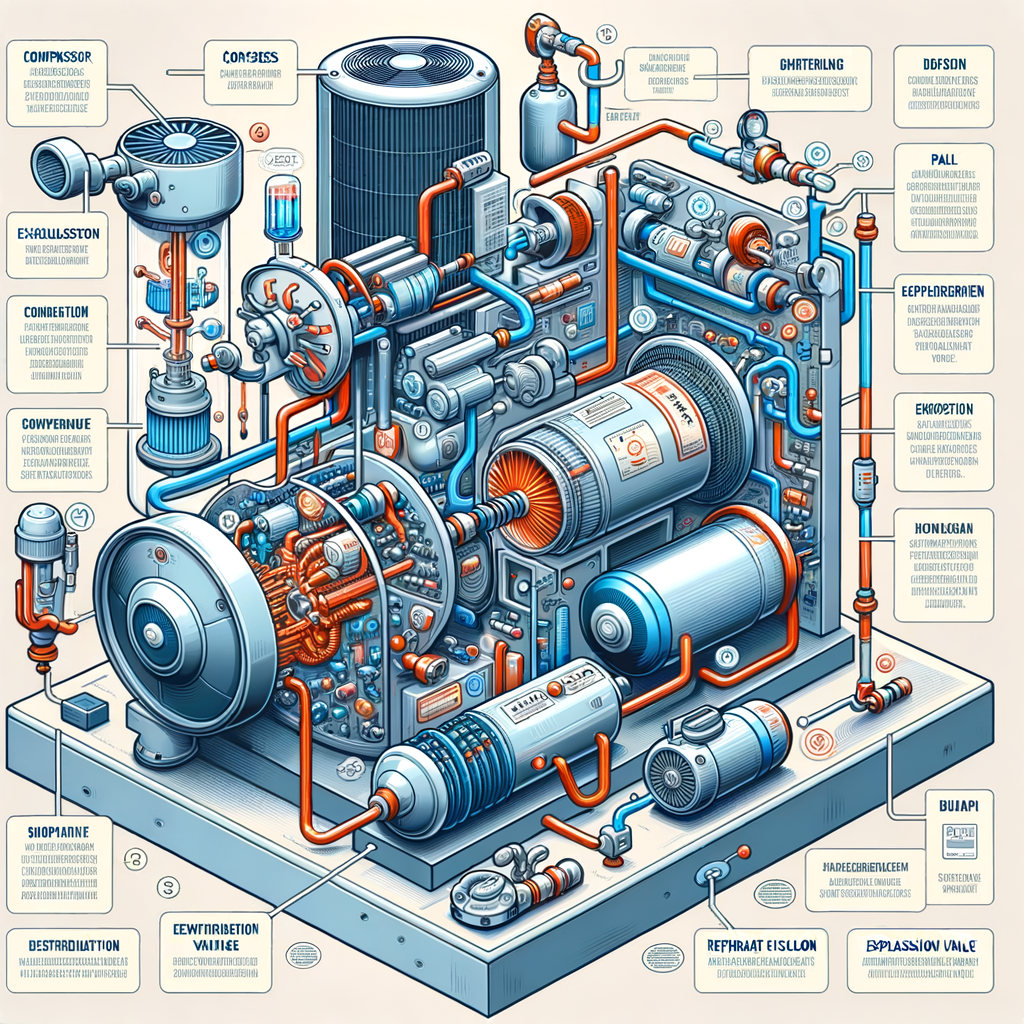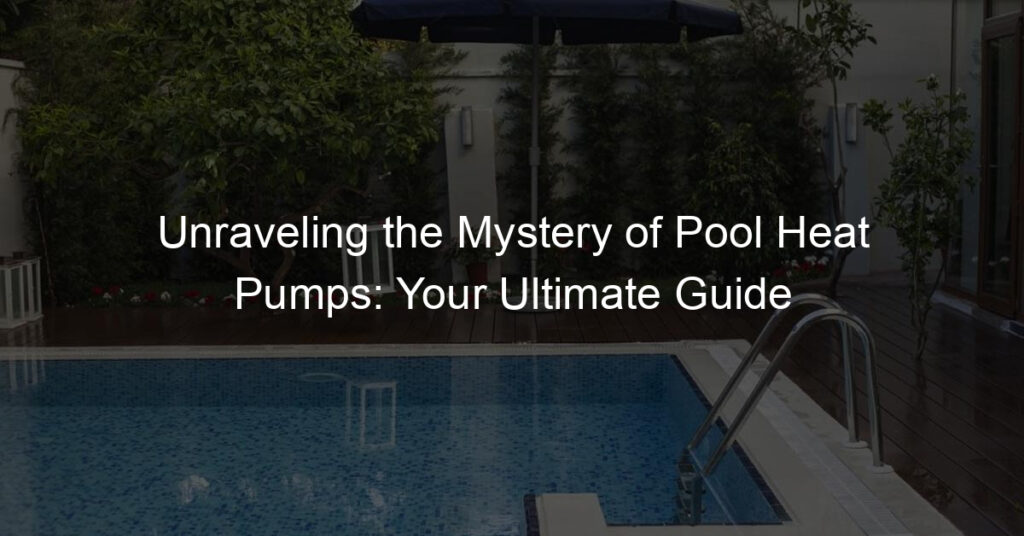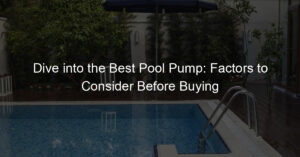
Introduction to Pool Heat Pumps
Pool heat pumps are an essential component for maintaining the perfect water temperature in your swimming pool. They are energy-efficient, cost-effective, and environmentally friendly, making them a popular choice for pool owners. In this section, we will delve into understanding pool heat pumps, explore their basic functions, and cover everything you need to know about them.
-
- Understanding Pool Heat Pumps
A pool heat pump is a device that uses electricity to extract heat from the surrounding air and transfer it to your pool water. It operates on a principle similar to an air conditioner, but in reverse. Instead of removing heat from the inside of your home and expelling it to the outside air, a pool heat pump takes heat from the outside air and moves it into your pool.
-
- Pool Heat Pump Basics
The basic operation of a pool heat pump involves three main components: the evaporator coil, the compressor, and the heat exchanger. The evaporator coil captures heat from the outside air, the compressor increases the heat, and the heat exchanger transfers the heat to the pool water. This process continues until the pool reaches the desired temperature.
-
- Everything about Pool Heat Pumps
Pool heat pumps are highly efficient and can save you up to 80% in energy costs compared to gas pool heaters. They work best in climates where the average air temperature is above 50 degrees Fahrenheit. They are also environmentally friendly as they do not produce any harmful emissions. However, they have a higher upfront cost than other types of pool heaters, but their lower operating costs make them a more economical choice in the long run.
In the following sections, we will delve deeper into how pool heat pumps work, their benefits, how to choose the right one for your pool, their installation and maintenance, and common problems and troubleshooting. By the end of this guide, you will have a comprehensive understanding of pool heat pumps and be able to make an informed decision about their use in your pool.
How Pool Heat Pumps Work
Understanding how pool heat pumps work is crucial to maximizing their benefits. Let’s dive into the details.
-
- Pool Heat Pump Information
A pool heat pump is a device that uses electricity to transfer heat from the surrounding air to your pool, keeping the water warm. It doesn’t generate heat; instead, it moves existing heat, making it an energy-efficient option.
-
- Pool Heat Pump Details
Pool heat pumps consist of several key components:
-
-
- Evaporator Coil: This part captures heat from the outside air.
- Compressor: It increases the temperature of the captured heat.
- Heat Exchanger: This transfers the heat from the pump to the pool water.
-
The pump operates until the pool water reaches the desired temperature. Then, it maintains that temperature with minimal energy use.
-
- Pool Heat Pump Explanation
Here’s a simple explanation of how a pool heat pump works:
-
- The pump draws in outside air through the evaporator coil.
- The captured heat is compressed to increase its temperature.
- The hot gas passes through the heat exchanger, warming the pool water.
- The cooled gas returns to its original state and the process repeats.
| Component | Function |
|---|---|
| Evaporator Coil | Captures heat from the outside air |
| Compressor | Increases the temperature of the captured heat |
| Heat Exchanger | Transfers the heat to the pool water |
Now that you understand how pool heat pumps work, you can make an informed decision about whether this system is right for your pool. In the next section, we’ll explore the benefits of using pool heat pumps.
Benefits of Using Pool Heat Pumps
Energy Efficiency
One of the primary benefits of using pool heat pumps is their energy efficiency. Let’s delve into how these systems save energy and how they compare to other heating systems.
-
- How Pool Heat Pumps Save Energy
Pool heat pumps work differently than other types of heaters. Instead of generating heat, they transfer it. They take heat from the surrounding air and use it to warm up your pool water. This process requires significantly less energy, making pool heat pumps an energy-efficient choice. According to the U.S. Department of Energy, heat pumps can be up to 80% more energy-efficient than traditional heating systems.
-
- Comparing Pool Heat Pumps with Other Heating Systems
When compared to other heating systems, pool heat pumps stand out for their energy efficiency. Traditional gas heaters, for example, burn fuel to create heat, which is less efficient and more costly in the long run. Solar heaters, while environmentally friendly, depend on the sun and may not provide consistent heating. On the other hand, pool heat pumps provide consistent, energy-efficient heating regardless of the weather.
In conclusion, if you’re looking for an energy-efficient way to keep your pool warm, pool heat pumps are a great option. They not only save energy but also provide consistent heating, making your swimming experience more enjoyable.
Cost Effectiveness
When it comes to pool heating solutions, cost effectiveness is a major factor to consider. Pool heat pumps, while having a higher initial cost, can provide significant long-term savings. Let’s explore this in more detail.
-
- Initial Costs and Long-Term Savings
Pool heat pumps are a bit pricier to purchase and install compared to traditional gas heaters. However, the initial investment is quickly offset by the long-term savings. Pool heat pumps operate at a fraction of the cost of a gas heater, making them a more economical choice in the long run. They are also more durable and require less maintenance, which means fewer repair costs over time.
-
- Case Study: Pool Heat Pump ROI
Let’s take a look at a real-world example. A homeowner in Florida decided to switch from a gas heater to a pool heat pump. The initial cost of the heat pump was higher, but the homeowner noticed a significant drop in their energy bills. After just two years, the savings on energy costs had paid for the initial investment in the heat pump. Now, the homeowner continues to enjoy lower energy bills and a comfortably heated pool, proving the cost-effectiveness of pool heat pumps.
In conclusion, while pool heat pumps may require a larger initial investment, their efficiency and durability lead to substantial savings in the long run. This makes them a cost-effective solution for pool heating.
Choosing the Right Pool Heat Pump
Choosing the right pool heat pump can be a challenging task. However, by understanding your pool’s heating needs, comparing different brands and models, and considering the size and capacity of the pump, you can make an informed decision. Let’s delve into these factors.
- Understanding Your Pool’s Heating Needs
Before you start looking for a pool heat pump, it’s important to understand your pool’s heating needs. This depends on factors such as the size of your pool, the temperature you want to maintain, and the climate in your area. For example, if you live in a colder region, you may need a more powerful pump to keep your pool warm. On the other hand, if you live in a warmer climate, a smaller pump may suffice.
- Comparing Different Brands and Models
Once you understand your pool’s heating needs, you can start comparing different brands and models. Look for a pump that is energy-efficient, durable, and has good customer reviews. Remember, the most expensive pump is not always the best. It’s about finding a pump that meets your specific needs and budget.
- Pool Heat Pump Size and Capacity
The size and capacity of the pool heat pump are also important factors to consider. The size refers to the physical dimensions of the pump, while the capacity refers to the amount of heat it can generate. A larger pool will require a pump with a higher capacity. However, a pump that is too large for your pool can lead to unnecessary energy consumption and higher electricity bills. Therefore, it’s crucial to choose a pump that is the right size and capacity for your pool.
Here is a simple table to help you understand how pool size correlates with heat pump size:
| Pool Size (in gallons) | Heat Pump Size (in BTU) |
|---|---|
| 10,000 – 20,000 | 75,000 – 85,000 |
| 20,000 – 30,000 | 85,000 – 100,000 |
| 30,000 – 40,000 | 100,000 – 120,000 |
In conclusion, choosing the right pool heat pump involves understanding your pool’s heating needs, comparing different brands and models, and considering the size and capacity of the pump. By taking these factors into account, you can find a pump that will keep your pool warm and comfortable, while also being energy-efficient and cost-effective.
Installation and Maintenance of Pool Heat Pumps
Installing and maintaining a pool heat pump is a crucial part of ensuring its longevity and optimal performance. This section will guide you through the installation process and best practices to follow.
Installation Process
The installation process of a pool heat pump involves two main steps: choosing the right location and following best practices for installation.
-
- Choosing the Right Location
Choosing the right location for your pool heat pump is essential. The pump should be installed in a well-ventilated area, away from windows and doors to avoid noise disturbance. It should also be placed on a level surface, preferably on a concrete pad, and should have enough space around it for easy maintenance and repair.
-
- Installation Best Practices
Once you’ve chosen the right location, it’s time to install the pump. Here are some best practices to follow:
-
- Ensure the heat pump is level and stable before connecting any pipes.
- Use a professional-grade sealant to prevent leaks.
- Connect the electrical supply according to the manufacturer’s instructions.
- After installation, run the pump for a few hours to check for any issues.
By following these steps, you can ensure a successful installation of your pool heat pump. Remember, if you’re not comfortable doing the installation yourself, it’s always best to hire a professional.
Maintenance Tips
Keeping your pool heat pump in top condition is crucial for its longevity and efficiency. Here are some maintenance tips to help you:
-
- Regular Cleaning and Check-ups
Regular cleaning and check-ups are essential to keep your pool heat pump running smoothly. Dust and debris can clog the system, reducing its efficiency and potentially causing damage. It’s recommended to clean the pump at least once a month. Also, check for any signs of wear and tear or unusual noises. A quick check-up can save you from costly repairs in the future.
-
- When to Call a Professional
While regular cleaning and check-ups can be done by yourself, some tasks require professional help. If your pump isn’t heating the pool as it should, or if it’s making strange noises, it’s time to call a professional. They have the expertise to diagnose and fix the problem quickly and safely. Remember, trying to fix complex issues on your own can lead to more damage and higher repair costs.
Maintaining your pool heat pump doesn’t have to be a daunting task. With regular cleaning and timely professional help, you can enjoy a warm and inviting pool all year round.
Common Problems and Troubleshooting
Even the best pool heat pumps can sometimes experience issues. But don’t worry! We’re here to help you recognize common problems, offer troubleshooting tips, and advise when it might be time to replace your pool heat pump.
-
Recognizing Common Pool Heat Pump Issues
There are a few common issues that can occur with pool heat pumps. Here’s a quick list:
- Not heating: This could be due to a low refrigerant level, a faulty thermostat, or a broken compressor.
- Making noise: Unusual noises might indicate a problem with the fan or motor.
- Tripping circuit breaker: This could be a sign of an electrical issue.
Remember, it’s important to address these issues quickly to prevent further damage to your pool heat pump.
-
Troubleshooting Tips
Here are some basic troubleshooting tips you can try before calling a professional:
- Check the power: Make sure the pool heat pump is plugged in and the circuit breaker hasn’t tripped.
- Inspect the thermostat: Ensure it’s set to the correct temperature.
- Clean the filter: A dirty filter can reduce the efficiency of your pool heat pump.
If these tips don’t solve the problem, it’s best to call a professional.
-
When to Replace Your Pool Heat Pump
Knowing when to replace your pool heat pump can save you time and money in the long run. Here are some signs that it might be time for a new one:
- Age: Most pool heat pumps last 10-15 years. If yours is older, it might be time for a replacement.
- Frequent repairs: If you’re constantly fixing your pool heat pump, it might be more cost-effective to replace it.
- Increased energy bills: An inefficient pool heat pump can lead to higher energy costs.
Remember, investing in a new pool heat pump can improve efficiency and save you money in the long run.
Conclusion: Pool Heat Pump Knowledge
As we wrap up our discussion on pool heat pumps, it’s important to reflect on the key points we’ve covered. From understanding how these devices work to the benefits they offer, choosing the right one, and maintaining it, we’ve delved into every aspect of pool heat pump knowledge. Let’s summarize the main takeaways and share some final thoughts on this topic.
- Key Takeaways
- Pool heat pumps work by extracting heat from the air and transferring it to your pool. They are an energy-efficient way to maintain a comfortable pool temperature.
- The benefits of using pool heat pumps include cost-effectiveness, energy efficiency, and environmental friendliness.
- Choosing the right pool heat pump depends on factors like your pool size, location, and personal preferences.
- Proper installation and maintenance of your pool heat pump can extend its lifespan and ensure optimal performance.
- Common problems with pool heat pumps can often be troubleshooted with basic knowledge and understanding of the device.
- Final Thoughts on Pool Heat Pumps
- Investing in a pool heat pump is a wise decision for any pool owner. Not only does it provide a comfortable swimming environment, but it also saves money and energy in the long run.
- Understanding how your pool heat pump works and how to maintain it can save you from unnecessary repair costs and extend the life of your device.
- Remember, the key to a well-functioning pool heat pump is regular maintenance and prompt troubleshooting of any issues.
In conclusion, pool heat pumps are an excellent addition to any swimming pool. They offer a multitude of benefits and, with the right knowledge, can be a long-lasting investment. We hope this guide has provided you with a comprehensive understanding of pool heat pumps and equipped you with the knowledge to make informed decisions regarding your pool heating needs.














